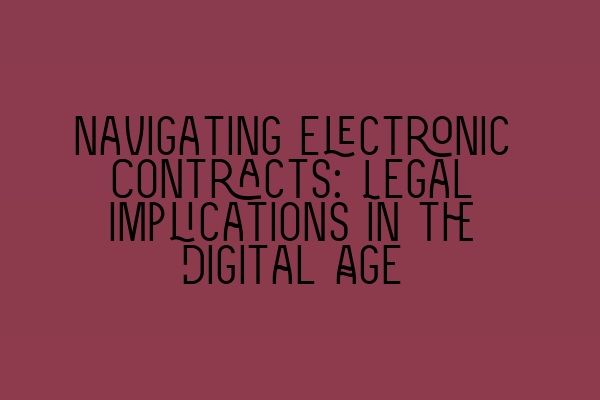Navigating Electronic Contracts: Legal Implications in the Digital Age
In our ever-evolving digital world, electronic contracts have become an integral part of conducting business. From online purchases to software agreements, electronic contracts offer convenience, speed, and efficiency. However, navigating the legal implications of electronic contracts can be complex and challenging. As a solicitor specializing in contract law, I understand the importance of understanding the legal landscape and ensuring compliance in the digital age. In this blog post, we will explore the legal implications of electronic contracts and provide practical tips to help you navigate this evolving landscape.
1. Understanding Electronic Contracts
Electronic contracts, also known as e-contracts, are agreements formed and entered into electronically. These contracts can encompass a wide range of transactions, including online purchases, software licensing agreements, and service contracts. The key element of an electronic contract is that it is formed and signed using electronic means, such as clicking a button or checking a box to indicate acceptance.
2. The Validity of Electronic Contracts
Electronic contracts are generally considered valid and enforceable, provided certain legal requirements are met. These requirements may vary depending on the jurisdiction and the nature of the transaction. In most cases, parties must have the intention to create a legally binding agreement, and there must be an offer, acceptance, and consideration. Additionally, parties must have access to and an opportunity to review the terms and conditions of the contract.
3. The Importance of Consent and Clarity
One of the challenges with electronic contracts is ensuring that both parties have given their consent and fully understand the terms of the agreement. To address this, it is crucial to have clearly presented terms and conditions, with the ability for parties to review and accept them before finalizing the contract. It is also advisable to provide an electronic signature option, adding an extra layer of authentication and evidence of consent.
4. Data Protection and Security
Electronic contracts often involve the collection and processing of personal data. It is essential to comply with data protection laws, such as the General Data Protection Regulation (GDPR) in the European Union. This means obtaining appropriate consent, implementing security measures to protect personal data, and providing individuals with rights over their data, such as the right to access, rectify, and erase personal information.
5. Record-Keeping and Audit Trails
One advantage of electronic contracts is the ease of record-keeping and creating audit trails. It is crucial to maintain accurate records of the electronic contract, including the terms and conditions at the time of acceptance, any amendments, and evidence of consent. These records can be invaluable for resolving disputes and demonstrating compliance with legal requirements.
6. International Considerations
When entering into electronic contracts with parties located in different jurisdictions, it is essential to consider the laws and regulations that may apply. International contracts may require additional considerations, such as choice of law provisions and dispute resolution mechanisms. Consulting with legal experts who specialize in international law can help ensure compliance and mitigate potential risks.
In conclusion, electronic contracts offer many benefits in the digital age. However, understanding the legal implications and ensuring compliance is crucial. By taking steps to ensure consent and clarity, protecting data, maintaining accurate records, and considering international considerations, you can navigate electronic contracts with confidence.
For further information and resources on the SQE contract law exam and practice materials, please visit the following links:
– SQE 1 Practice Exam Questions
– SQE 1 Practice Mocks FLK1 FLK2
– SQE 2 Preparation Courses
– SQE 1 Preparation Courses
– SRA SQE Exam Dates
As always, it is advisable to consult with an experienced solicitor for specific legal advice tailored to your circumstances.
